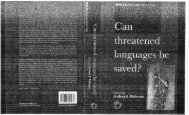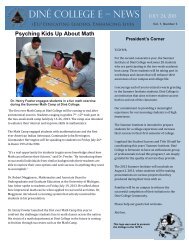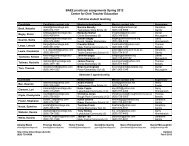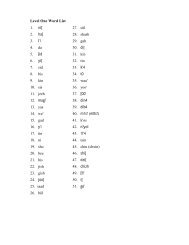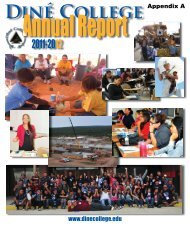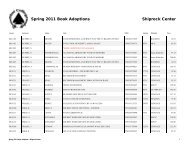Diné College Course Catalog 2008-2009 (pdf)
Diné College Course Catalog 2008-2009 (pdf)
Diné College Course Catalog 2008-2009 (pdf)
Create successful ePaper yourself
Turn your PDF publications into a flip-book with our unique Google optimized e-Paper software.
CIS 111 Introduction to Computers (3)<br />
Prerequisite: ENG 100B, FST 131, and MTH 051.<br />
Concepts of information systems and computer<br />
terminology; introduction to and hands-on experience<br />
with state-of-the-art computing resources-hardware,<br />
software, and networking; and introduction to a<br />
general-purpose programming language. Two hours<br />
of laboratory per week required.<br />
Computer Science (CSC)<br />
CSC 140 Hardware Fundamentals (3)<br />
Introduction to electronics as it applies to computers.<br />
Theory of computer hardware and how programs are<br />
implemented in that hardware. Practical skills of<br />
maintaining, upgrading and building computers.<br />
Three hours lecture and two hours laboratory per<br />
week.<br />
CSC 150 Programming Fundamentals (3)<br />
Corequisite: MTH 100. This is the first programming<br />
course for CS majors - a re-introduction to computers<br />
from a programmer’s perspective. Topics include:<br />
history of computers; social and ethical aspects of<br />
computers; working with files and folders;<br />
fundamentals of procedural programming (data types,<br />
variables, control structures, functions and arrays,<br />
input/output, built-ins); the use of pseudocode; highlevel<br />
languages (interpreted and compiled); the basics<br />
of software development. Three hours lecture and<br />
two hours laboratory per week.<br />
CSC 170 Web Fundamentals (3)<br />
Corequisite: ENG 100B. Web fundamentals for CS<br />
majors. How to create structured documents and<br />
share them on a network. HTTP, HTML, XML and<br />
CSS. Media on the web: images; sound; animation<br />
and text encodings. Security and usability.<br />
Integrating programs and data-bases with web<br />
documents. Three hours lecture and two hours<br />
laboratory per week.<br />
CSC 190 OS FUNDAMENTALS (3)<br />
Corequisite: CSC 150 or CSC 170. Fundamentals of<br />
operating systems – theory and system administration<br />
using Linux or other POSIX compliant OS. Three<br />
hours lecture and two hours laboratory per week.<br />
CSC 195 Special Topics (3)<br />
Prerequisites: Consent of instructor & department<br />
approval. This course will cover special topics not<br />
covered in the other courses in the curriculum. The<br />
exact content will depend on student interest and on<br />
the availability and interests of instructors. This<br />
course can be repeated for credit if the topics differ.<br />
CSC 200 Object Oriented Programming (3)<br />
Prerequisite: CSC 150. This course assumes that<br />
students are familiar with the basics of procedural<br />
programming. Students should already be able to<br />
write, from scratch, simple programs that use<br />
variables, conditionals, loops and arrays. The course<br />
will begin with a preview of this material. Then<br />
students will be introduced to the basics of objectoriented<br />
programming. Key notions are classes,<br />
objects, properties, and methods. Emphasis is on<br />
building programs using the object-oriented<br />
paradigm. Three hours lecture and two hours<br />
laboratory per week.<br />
CSC 210 Systems Analysis and Design (3)<br />
Prerequisite: CSC 150. Principles of information<br />
systems analysis and design using high-level<br />
development tools. Covers flow diagrams, pert<br />
charts, and gantt charts. Requires a case study (small<br />
group) project. Three hours lecture and two hours<br />
laboratory per week.<br />
CSC 240 Network Fundamentals (3)<br />
Prerequisites: either CSC150 or CSC170.<br />
Introduction to the fundamentals of computer<br />
networking. History of networking. Network<br />
standards and protocols. The OSI and TCP/IP<br />
reference models. Practical examples of Ethernet<br />
LANs and IP routing. Network monitoring and<br />
management. Common network services. Wireless<br />
networks. Three hours lecture and two hours<br />
laboratory per week.<br />
CSC 250 Data Structures and Algorithms (3)<br />
Prerequisite: CSC 150 and CSC 200. This course<br />
covers fundamental data structures and the<br />
algorithms used to process them. The data structures<br />
include arrays, linked lists, stacks, queues, lists,<br />
dictionaries and trees. The algorithms include<br />
recursion and various search and sorting techniques.<br />
Three hours lecture and two hours laboratory per<br />
week.<br />
CSC 260 Computer Organization & Architecture (3)<br />
Prerequisite: CSC 150 and MTH 210. Basic concepts<br />
of computer organization and architecture: how<br />
digital logic is implemented on hardware; data<br />
representation; circuits; assembly language; I/O;<br />
system software; hardware components. Three hours<br />
lecture and two hours laboratory per week.<br />
CSC 295 Internship or Practicum (3)<br />
Prerequisites: Department approval and at least 3<br />
semesters of Computer Science. The student will<br />
work with CS faculty to customize an internship or<br />
practicum that will tie together, and go beyond, what



